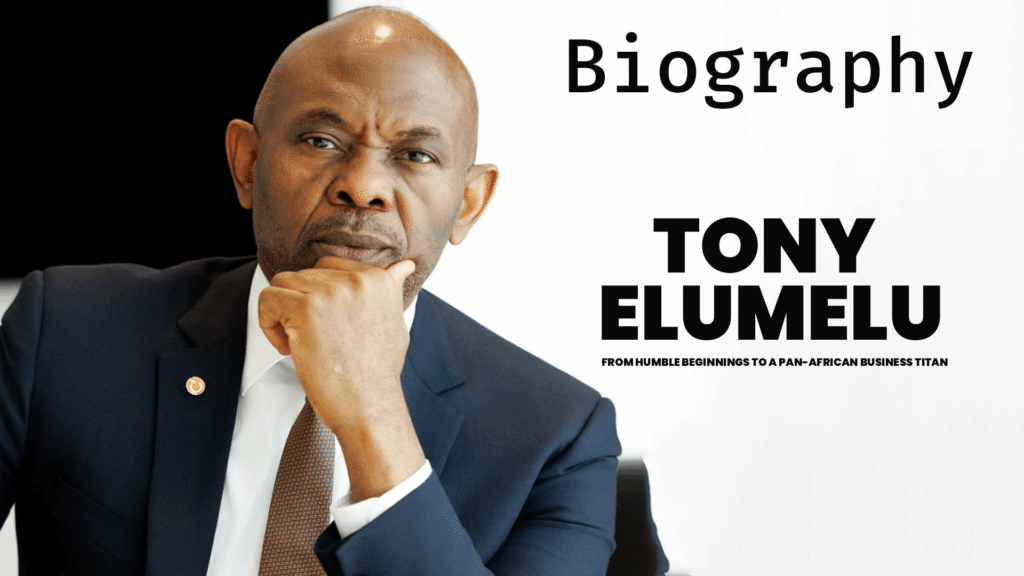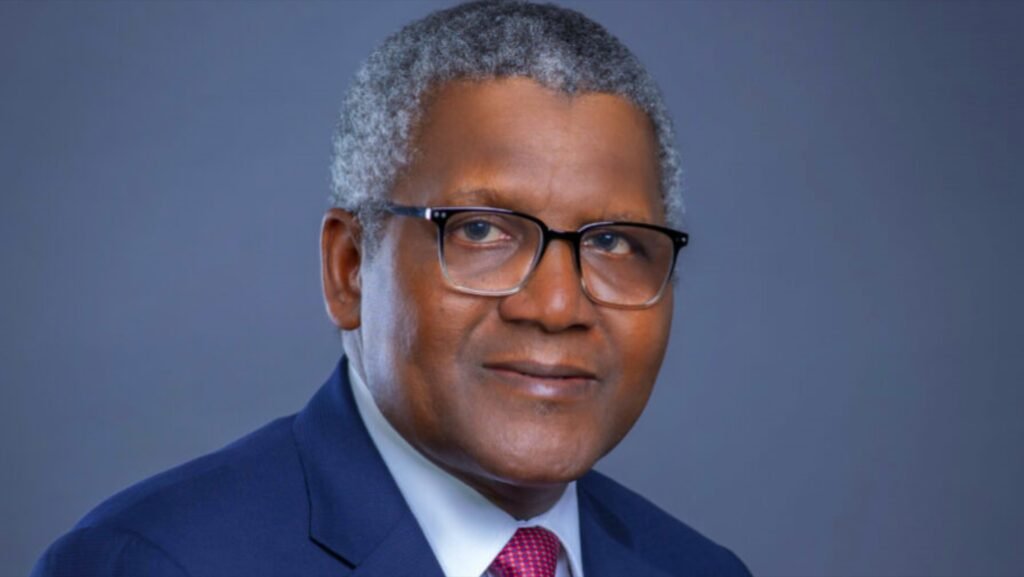Tony Elumelu, often referred to as the “Nigerian cowboy of banking,” is a name synonymous with resilience, ambition, and transformative leadership in Africa’s financial and entrepreneurial landscape. Unlike many billionaires who inherit wealth or leverage existing networks, Elumelu built his empire from the ground up, turning challenges into opportunities and redefining the possibilities for African entrepreneurship. His remarkable journey, which caught the attention of the Harvard Business School for a dedicated case study, is a testament to the power of hard work, strategic vision, and a touch of serendipity. This biography traces the extraordinary life of Tony Elumelu, from his modest upbringing to his rise as a global business magnate and philanthropist, organized into distinct phases that highlight his evolution.
Phase 1: A Modest Beginning in Jos (1963–1980)
Early Life and Family Roots
Born on March 22, 1963, in Jos, Plateau State, in northern Nigeria, Tony Onyemaechi Elumelu entered the world in a region known for producing some of Nigeria’s most successful business tycoons, including Aliko Dangote and Abdulsamad Rabiu. Growing up in a middle-class family of five children, Tony was neither born into wealth nor poverty. His parents, Dominic and Suzanne Elumelu, provided a stable and nurturing environment, prioritizing education as a pathway to a better future. Jos, a cosmopolitan city with a blend of cultures, offered young Tony early exposure to diversity, shaping his adaptability and open-mindedness—qualities that would later define his business acumen.
Education in Jos and Warri
Tony’s educational journey began at St. Patrick’s Primary School in Jos, a prestigious institution that laid a strong academic foundation. His parents, recognizing the importance of broadening his horizons, sent him to the South-South region of Nigeria for secondary education. At the Federal Government College in Warri, Delta State—his family’s ancestral home—Tony experienced life in a different cultural and geographical context. This move not only balanced his worldview but also ignited a curiosity and hunger for exploration that would influence his later decisions. Excelling in his studies, Tony developed a keen interest in economics, a subject that resonated with his analytical mind and fascination with systems that drive prosperity.
Phase 2: Academic Pursuits and Early Career Struggles (1980–1990)
University Education and Academic Challenges
After completing secondary school, Tony pursued higher education at Ambrose Alli University (formerly Bendel State University) in Edo State, located in Nigeria’s Middle Belt. Studying economics, he graduated with a Bachelor of Science degree, earning a lower second-class honors. While this academic outcome was respectable, it fell short of the upper second-class distinction often required for competitive opportunities in Nigeria’s job market. Undeterred, Tony’s ambition led him to further his education at the University of Lagos, where he earned a Master’s degree in Economics. This advanced degree deepened his understanding of financial systems and prepared him for the challenges ahead.
National Youth Service and First Banking Exposure
Like many Nigerian graduates, Tony participated in the mandatory National Youth Service Corps (NYSC) program, which placed him at Union Bank, one of Nigeria’s leading commercial banks. This opportunity marked his first foray into the banking industry, where he quickly developed a passion for finance and accounting. Immersed in the fast-paced world of banking, Tony honed his analytical skills and gained insights into the operational dynamics of financial institutions. However, the end of his one-year NYSC tenure brought an unexpected setback: Union Bank did not offer him a permanent position, leaving him to navigate the uncertainty of unemployment.

A Pivot to Sales: Resilience in Adversity
Faced with the challenge of securing a role in Nigeria’s competitive banking sector, Tony took a detour into the marketing industry, working as a copier salesman. Selling office equipment such as printers and photocopiers, he traversed Lagos, pitching to businesses and sharpening his negotiation and interpersonal skills. This period of street-level hustle was humbling yet formative, teaching him the value of persistence and adaptability. Tony later reflected that, like thousands of young Nigerian graduates, he was driven by a relentless hunger to succeed, a trait that set him apart even in the face of adversity.
Phase 3: Breaking into Banking at Allstates Trust Bank (1990–1997)
A Bold Application and a Stroke of Luck
Tony’s fortunes changed when Allstates Trust Bank announced a job vacancy targeting young university graduates. The opportunity was a perfect fit for his skills and aspirations, but there was a significant hurdle: the job required a minimum of an upper second-class degree, a criterion Tony did not meet. Undeterred, he took a bold approach, completing the application form with transparency about his academic standing. In his cover letter, he wrote, “Even though I do not meet these requirements, if you give me the chance, I will prove myself.” This candid yet confident plea caught the attention of the bank’s chairman and CEO, who decided to give the young applicant a chance.
Tony’s determination paid off when he was invited to the screening process, competing against hundreds of other graduates. His performance during the selection process was exceptional, and he secured a role at Allstates Trust Bank, marking the official start of his banking career. This moment was a turning point, proving that a combination of courage, honesty, and luck could open doors otherwise closed.

Rapid Rise Through the Ranks
Determined to validate the faith placed in him, Tony approached his role with unparalleled dedication. His hard work and analytical prowess quickly earned him recognition within the bank. Within just 12 months, at the age of 27, he achieved an unprecedented feat in the Nigerian banking industry: promotion to branch manager. This rapid ascent was a testament to his ability to deliver results and inspire confidence in his superiors. Tony later expressed gratitude to his bosses, who not only recognized his potential but entrusted him with significant responsibilities, setting the stage for his future leadership roles.
Phase 4: Transforming Crystal Bank into Standard Trust Bank (1997–2005)
A Daring Acquisition at Age 34
In 1997, at the age of 34, Tony Elumelu made a bold move that would cement his legacy in Nigeria’s banking industry. Leading a group of young, visionary investors, he orchestrated the acquisition of Crystal Bank, a struggling financial institution on the brink of collapse. The bank’s stakeholders, eager to offload what they perceived as a sinking ship, sold it to Tony in a distress sale. For Tony, this was not a liability but an opportunity to build something extraordinary. He assumed the role of CEO, becoming the youngest bank CEO in Nigeria at the time.
A Three-Tier Turnaround Strategy
Renaming the institution Standard Trust Bank (STB), Tony and his team devised an ambitious three-tier strategic plan to revive the bank:
- Revitalize the Bank: Restore profitability and stabilize operations.
- Top Ten Ambition: Elevate STB to one of Nigeria’s top ten banks within seven years.
- Top Three Goal: Position STB among the top three banks in Nigeria by the tenth year.
This roadmap was audacious, given the bank’s dire financial state and the competitive landscape, which included over 120 commercial banks during Nigeria’s banking boom in the late 1990s.
Remarkable Turnaround and Industry Recognition
Tony’s leadership transformed Standard Trust Bank in ways that defied expectations. Within seven months, the bank’s revenue soared from 6.49 million naira to over 473 million naira, a staggering achievement that showcased his strategic brilliance and execution capabilities. By 2000, STB was financially stable, and by 2004, it had achieved its second-tier goal of ranking among Nigeria’s top ten banks—well ahead of schedule. Tony’s ability to attract talent, foster innovation, and implement customer-centric policies earned him widespread recognition in the banking sector.
The Historic UBA Merger
In 2005, Tony orchestrated a landmark merger between Standard Trust Bank and the United Bank for Africa (UBA), creating one of the largest financial institutions in Sub-Saharan Africa. The merger, considered the biggest in the region at the time, propelled UBA into the top three banks in Nigeria, fulfilling Tony’s third-tier objective years ahead of schedule. To prepare for this monumental task, Tony had enrolled in Harvard Business School’s Advanced Management Program, equipping himself with the skills to navigate the complexities of leading a major financial institution.
Phase 5: Global Expansion with UBA and Beyond (2005–2010)
Leading UBA to Continental and Global Heights
As the CEO of the newly merged UBA, Tony set his sights on expanding the bank beyond Nigeria’s borders. He introduced another three-tier strategy focused on:
- Consolidating Dominance in Nigeria: Strengthening UBA’s position as a market leader.
- Continental Expansion: Establishing a presence across Africa.
- Global Reach: Planting UBA’s flag in key international markets.
Under his leadership, UBA expanded into 20 African countries, including Ghana, Kenya, and South Africa, becoming a pan-African banking powerhouse. The bank also established branches in global financial hubs such as London, Paris, and New York, making UBA the only African bank with operations in the United States at that time. Tony’s philosophy of making bold, audacious moves fueled this expansion, as each milestone inspired the pursuit of the next.
A Forced Exit and New Horizons
In 2010, the Central Bank of Nigeria introduced a policy limiting bank CEOs’ tenures to a maximum of ten years. This regulation forced Tony to step down as UBA’s CEO, but he viewed it as an opportunity to explore new ventures. Remaining the largest shareholder with a 10.63 percent stake, he continued to influence UBA’s direction as chairman of the board. His departure from the CEO role marked the beginning of a new chapter, one that would see him diversify his investments and amplify his impact across multiple sectors.
Phase 6: Building Heirs Holdings and Transcorp Takeover (2010–Present)
Founding Heirs Holdings
In 2010, Tony founded Heirs Holdings, a family-owned investment company, to channel his wealth and expertise into diverse sectors, including hospitality, energy, and real estate. This move reflected his vision of creating a lasting family legacy that would transcend his lifetime. Heirs Holdings became the vehicle for his boldest investments, leveraging his banking experience to identify and transform undervalued assets.
The Controversial Transcorp Hilton Acquisition
One of Tony’s most significant and controversial moves was his acquisition of a controlling stake in Transcorp Hilton, Nigeria’s largest hotel. The deal involved a complex interplay with fellow billionaire Femi Otedola, who had previously supported Tony during the UBA acquisition by purchasing $20 million in shares. By 2007, Otedola was chairman of Transcorp, holding a 5 percent stake. Meanwhile, Tony quietly increased his shareholdings in the company.
In 2008, when Otedola faced financial difficulties, Tony seized the opportunity to acquire Otedola’s UBA shares and his stake in the African Finance Corporation. In a surprising twist, Otedola agreed to sell his Transcorp shares to what he believed was an American firm, only to discover that the buyer was Tony Elumelu. This acquisition led to Otedola’s resignation as Transcorp’s chairman, with Tony assuming leadership of the Transcorp Group. Today, Transcorp Hilton stands as a crown jewel in Tony’s portfolio, symbolizing his ability to navigate complex deals and emerge victorious.
Phase 7: Philanthropy and Africapitalism (2010–Present)
The Tony Elumelu Foundation
In 2010, Tony established the Tony Elumelu Foundation (TEF), a philanthropy dedicated to empowering African entrepreneurs. Grounded in his philosophy of Africapitalism, which positions the African private sector as the engine for economic and social progress, TEF has transformed the entrepreneurial landscape. The foundation has provided over $100 million in funding to more than 20,000 young entrepreneurs across Africa, creating jobs and fostering innovation. Its digital platform has reached over 1.5 million Africans, offering training, mentorship, and networking opportunities.
A Legacy of Impact
Through TEF, Tony has redefined philanthropy in Africa, emphasizing empowerment over charity. His initiatives have supported startups in sectors ranging from agriculture to technology, contributing to economic development and youth employment. The foundation’s annual TEF Forum has become a flagship event, bringing together entrepreneurs, policymakers, and investors to drive Africa’s economic transformation.
Phase 8: Personal Life and Legacy Building
A Luxurious Lifestyle
At 62, Tony Elumelu’s net worth exceeds $2.15 billion, reflecting his success across banking, hospitality, and investments. His lifestyle mirrors his achievements: he owns a fleet of high-end cars, an opulent mansion in Ikoyi, Lagos, and an extensive art collection potentially worth millions. His Dassault Falcon 7X private jet, valued at nearly $60 million, underscores his status as one of Nigeria’s elite. A lover of music and celebrations, Tony has been known to host exclusive performances by top Afrobeat artists at his private events, with Spotify curating a personalized playlist for him.

Family and Values
Despite his wealth and influence, Tony considers his family his greatest treasure. Married to Vivian Awele since 1993, he is a devoted father to seven children, including triplet girls and twin boys. His commitment to family extends to his business endeavors, as he aims to build a legacy through Heirs Holdings that his children can inherit and expand. Tony’s philosophy of balancing ambition with personal values has made him a role model for aspiring entrepreneurs.
Reflections on Success
Tony attributes his meteoric rise to two factors: hard work and luck. He often recounts the pivotal moment when the chairman of Allstates Trust Bank took a chance on his application, highlighting how a single opportunity, combined with relentless effort, can change a life. His story is a powerful reminder that success is not solely about credentials or resources but about seizing moments and proving one’s worth.

Conclusion: A Visionary’s Enduring Impact
Tony Elumelu’s journey from a copier salesman to a billionaire banker and philanthropist is a saga of grit, vision, and strategic brilliance. His transformation of struggling institutions like Standard Trust Bank and UBA, coupled with his bold investments through Heirs Holdings, has redefined African business leadership. Through the Tony Elumelu Foundation, he continues to empower the next generation, ensuring his legacy extends beyond wealth to meaningful impact. As he navigates the global stage at 62, Tony remains a beacon of possibility, proving that with hard work, courage, and a touch of luck, an ordinary individual can build an extraordinary empire.
#tonyelumelu #100Dayscontentchallenge #100dcc #uba #TEF #Heirsholding #transcorp #crystalbank #standardtrustbank #vivianawele
written by Kennedy Nwaeze
Drop your comments

